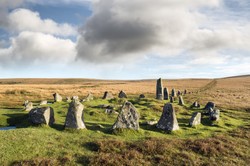Hutton is careful not to draw premature conclusions from inadequate data, so he never makes a claim that cannot be supported by the data. He fully grasps the limitations of archaeology as a means of establishing what people of the past believed, so whenever there are varying interpretations of data he gives them all.
The book is particularly adept at exposing the philosophical and cultural assumptions which archaeologists have brought into their thinking. He notes the way in which imperialist thinking with its superior races conquering simpler natives has distorted the interpretation of British data, and this is especially so with theories of invading Celtic hordes, who did not exist on the scale imagined by Victorian imperialist scholars, and invading Saxons, for whose invasions he presents pros and cons without concluding one way or another.
He enlightens us as to the wide variety of burial practices among ancient Britons, and how burial customs seem to differ according to tribal areas. Thus the text is a useful antidote to excessive simplification which sees countrywide cultures where they did not exist. It is also an antidote to the arrogant cultural assumption found among some earlier scholars that native Britons were culturally unimaginative and had to be taught new ideas by the Romans. a view that derives from the snobbery of Victorians with a classical education.
The book examines the role of the Victorian period in re-imagining paganism, and its account of the evolution of pagan ideas in the nineteenth and twentieth centuries is a good contribution to scholarship.
There is much factual material in the book, but Hutton's insights into the question of whether or not paganism survived through the mediaeval period are important. While he does not believe in a surviving pagan cultus, he accepts that pagan ideas and customs persisted. Mediaeval Catholicism he sees as essentially Christian with much pagan cultural inheritance found in its various forms. This is surely correct. Of particular interest is his account of how during the Roman period the Britons seemed to have taken a renewed interest in the forgotten monuments of previous ages and how some Roman sites contain salvaged bronze age implements. This was entirely new to me.
If I have a reservation about the work it is that it substantially, though not totally, overlooks Ireland. This may be due to pressures of space in what is a four hundred page volume, not to mention the copious references. But the two isles are culturally connected, and one can throw light upon the other.
Another issue is his discussion of the apparent conflict between genetic data, which reveal limited Anglo-Saxon settlement in Britain and linguistic data, which reveal almost no survival of Celtic languages, which would indicate mass Anglo-Saxon settlement at the expense of the Britons. This inconsistency he could have resolved had he considered Oppenheimer's view expounded in The Origins of the British that in Eastern England Welsh/Celtic was not spoken, but that the language there was a Germanic tongue, so the Celtic could not have survived where it was not spoken. This view is based upon Oppenheimer's observation that East and West England were repopulated after the Ice Age by different groups of settlers, so there would have been linguistic differences. He might also have noted that Welsh was spoken across large swathes of Western England until the eighteenth century, evidence of native Celtic survival.








 Pilgrimage. A review26 days ago
Pilgrimage. A review26 days ago
 Leo the Fourteenthon 05/09/2025
Leo the Fourteenthon 05/09/2025
 The Melsonby Hoardon 03/25/2025
The Melsonby Hoardon 03/25/2025




Comments
We cannot know anything for certain in paranormal matters.
Thank you for your comment below in answer to my previous observation and question.
Perhaps ancient stones that maintain ancient ghosts and their movements must not be moved from one another or from their sites.
Would it seem possible that relocating and repurposing -- if such be their fate -- those 17 missing stones would work against their ghosts who were used to working together?
Almost certainly, but the details of legends are unknown to us.
Thank you for your comment below in answer to my previous observation and question.
Your wizzleys/wizzlies elsewhere associate ancient stones with ancient archiving of anciently ghostly activities.
Might Dartmoor stones have such an association?
Any or all of these could be final destinations for megalith repurposed. It is possible that some were broken up.
Thank you for your comment below in answer to my previous observation and question.
Repurposed stones intrigue me.
Would such seemingly valuable stones have been repurposed as mundane outside walks and walls or as singular flooring, thresholds or walls?
Probably repurposed.
Thank you for your comment below in answer to my previous observation and question.
My comments Mar 16, 2023, indicated to you Prehistoric Dartmoor Walks as an online source that I inspected.
That site mentions perhaps 174 original stones to the Dartmoor Site. It numbers 157 as still standing today.
Would the 17 missing stones have been relocated by strong weather or repurposed or weathered into nothingness?
Not really. Material published in Britain and America is shared in common, so with the possibility of a time lag what we get, you get.I have ordered books from the USA.
Online sources indicate little about Down Tor Stone Row and Cairn Circle.
The Dartmoor Site looks interesting with its progressively smaller stones down the hill. The site Prehistoric Dartmoor Walks mentions that there still stand 157 stones even as there once was perhaps 174.
Would there be any more information on your, eastern (Atlantic) pond side?